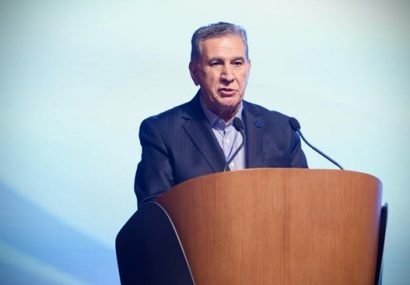Iran and Azerbaijan Set Sights on Expanding Trade to Multi-Billion-Dollar Levels
TEHRAN (Iran News) Speaking at the Iran-Azerbaijan Business Forum in Baku — an event attended by the presidents of both nations — Samad Hassanzadeh, President of Iran’s Chamber of Commerce, Industries, Mines, and Agriculture, expressed confidence in the future of the partnership.
Hassanzadeh noted that while bilateral trade stood at around $900 million in 2024, efforts are underway to substantially increase this figure. Leading a senior Iranian trade delegation composed of private sector leaders and top executives from multiple industries, he emphasized that the forum represents a pivotal step toward deepening fraternal relations and expanding economic cooperation.
“With our strong historical, cultural, and religious bonds — and a 765-kilometer shared border — Iran and Azerbaijan have immense capacity to enhance their economic ties,” Hassanzadeh said.
Hassanzadeh highlighted the strategic role of completing the Rasht–Astara railway, the missing link in the International North-South Transport Corridor. The project is expected to reduce transit times between Asia and Europe and strengthen both countries’ positions in global logistics networks. Development of the Astara and Anzali ports was also emphasized as crucial for improving regional connectivity.
Recent trilateral gas swap agreements between Iran, Azerbaijan, and Turkmenistan have created new opportunities in the energy sector. Both sides are exploring joint investments in energy transmission infrastructure and power generation projects along their border regions, he added.
He also proposed partnerships in smart agriculture technologies, including greenhouse farming, advanced irrigation systems, and the export of processed agricultural goods to satisfy Azerbaijan’s increasing demand.
With reconstruction efforts underway in Azerbaijani territories, Iranian firms are positioned to contribute expertise in infrastructure development — including road construction, dam building, electrification, and the establishment of schools and hospitals, Hassanzadeh noted.
Construction and Engineering Services:
Iran’s longstanding experience in engineering and construction offers valuable support for Azerbaijan’s infrastructure expansion plans. Hassanzadeh proposed organizing technical meetings between private sector representatives from both countries to explore joint ventures.
Both nations’ emphasis on digital transformation opens avenues for collaboration in IT services, e-commerce, cybersecurity, and digital infrastructure development.
He went on to say shared cultural heritage, simplified visa regulations, and health tourism initiatives present promising areas for cooperation. Plans for joint Iran-Azerbaijan tour packages aimed at attracting tourists from third countries are also under discussion.
To facilitate the envisioned growth, Hassanzadeh stressed the importance of: Streamlining visa procedures for business professionals; Expanding economic representative offices; Removing banking and financial obstacles; Enhancing logistics and customs processes; and Negotiating a free trade or preferential trade agreement to lower tariffs.
The Iran Chamber of Commerce, alongside the Iran-Azerbaijan Joint Chamber, stands ready to support these initiatives by organizing trade missions and hosting specialized exhibitions.
In closing, Hassanzadeh expressed optimism that the forum would usher in a new era of industrial, economic, and investment cooperation — ultimately driving a major expansion in trade between Iran and Azerbaijan.
Meanwhile Yusif Aliyev, Executive Director of Azerbaijan’s Trade and Investment Development Office, said trade relations between Iran and Azerbaijan have witnessed significant growth, with a reported 18% increase in the first three months of 2025 compared to the same period last year.
Speaking at a business forum during an Iranian trade delegation’s visit to Azerbaijan, Aliyev highlighted the dynamic role Iranian businesses play in Azerbaijan’s economy. “Over 1,739 Iranian companies have invested in Azerbaijan, totaling approximately $5.2 million,” he said. He added that numerous joint projects are currently under review and implementation.
Aliyev emphasized the importance of high-level political engagement, stating that the presence of the two countries’ presidents at recent meetings has been a turning point in strengthening bilateral ties. “Islamic unity serves as a solid foundation for achieving shared goals and enhancing economic cooperation,” he noted. Increased government-level contacts have also played a key role in advancing relations.
Reflecting on the 16th meeting of the Iran-Azerbaijan Joint Commission, Aliyev said discussions covered investment across various sectors. He expressed optimism that with the positive investment experiences already established, conditions for broader cooperation would continue to improve.
In the first quarter of 2025, trade between the two nations reached approximately $157 million. Aliyev pointed out that the Azerbaijani Investment Promotion Agency has streamlined business operations by introducing a one-stop-shop model, offering incentives and tax exemptions to encourage investment and trade.
Welcoming the signing of preferential and free trade agreements between Iran and Azerbaijan, Aliyev revealed that Iranian businesses have identified and entered 91 new projects in Azerbaijan.
He also stressed the cultural dimension of economic relations, citing carpet weaving as an important symbol of unity between the two nations. An international carpet festival is scheduled to take place in Baku at the end of this week, further showcasing the deep-rooted cultural ties.
Aliyev concluded by noting that today’s business forum serves as a vital platform for deepening economic partnerships and paving the way for stronger bilateral relations.
- source : IRAN NEWS ECONOMIC DESK






























